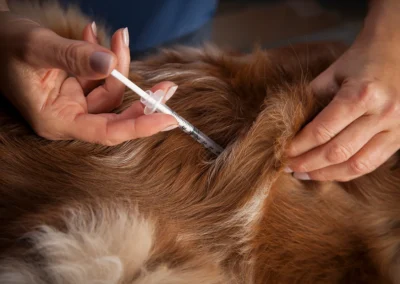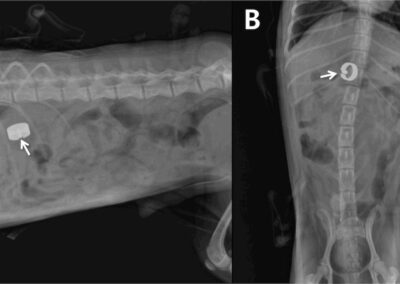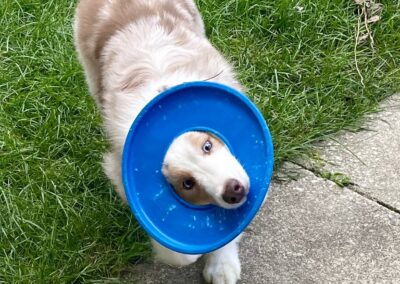[vc_row][vc_column][trx_section box=”yes”][trx_title align=”center” color=”#d9ae4c” weight=”700″]
Vaccinations
[/trx_title][trx_title align=”center” color=”#d9ae4c” weight=”700″]
What is needed to keep our pups safe?
[/trx_title][trx_title type=”4″ align=”center” color=”#434544″ weight=”700″ bottom=”mini”]by Dr. Eileen Savier CVA, CVCH[/trx_title][vc_column_text]

As a brief and crash course on vaccinations – core vaccines for dogs are established by AAHA and are Canine Distemper, Adenovirus Type 2, Parovovirus, +/- Parainfluenza. These are started at 6-8 weeks of age and are boostered every 3-4 weeks until the puppy is 15-16 weeks of age. They are then boostered again at the one year mark and then done every three years (phew)! The rabies virus is also a core vaccine given as early as 12 weeks, repeated at one year of age, then every three years. Optional vaccines include Bordetella, Influenza (H3N8 and H3N2), Lyme, Leptosporosis, and in some areas of our country (NOT Ohio), there is a vaccination for rattlesnake toxins. These optional vaccinations are typically given annually. As with most areas of science, there is ongoing research on the longevity of all of these vaccinations and we are always learning and discovering new things.
How do we decide what to give our pup? Simply – talk to your veterinarian and assess your pet’s risk and choose optional vaccinations based on your lifestyle and the specific needs for your area.
My vet mentioned an Antibody Titer Test – huh? The Antibody Titer Test or Titers for short – detect the presence and measures the amount of antibodies within a dog’s blood. The amount and diversity of antibodies correlates to the strength of the bodies immune response. Titers are an option for Distemper, Adenovirus, and Parvovirus. Right now, there are no titer tests available for Leptosporosis or the other optional vaccinations. There is a titer test available for the Rabies vaccination, but this is typically one done if you pet is traveling to a Rabies free location (Japan) – it is required as proof of vaccination and that antibodies are present – NOT that your pet would be protected if inoculated with the virus. AAHA has put together a list of reason titers may be performed:
- Owner request.
- Assess the response following completion of initial vaccine series.
- Testing in lieu of re-vaccinating a dog that has a history of prior vaccine adverse reaction.
- Testing in lieu of re-vaccinating a dog that has a history of a known illness.
My opinion is that prevention is better than disease, particularly if the disease is fatal or can be transmitted to people. Leptosporosis and Lyme disease are sometimes difficult to diagnose and treatment is tough and expensive. Your pet may not return to normal after illness, if he or she recovers at all. It sounds grim and dire, but the good news – it is preventable. As always, don’t be afraid to talk to your vet, ask questions, and make the best decision for your pet and your family.
To healthy pups – Dr. Eileen[/vc_column_text][/trx_section][/vc_column][/vc_row][vc_row css=”.vc_custom_1533135180690{margin-top: 40px !important;}”][vc_column css=”.vc_custom_1533134942241{background-color: #d9ae4c !important;}”][trx_title type=”2″ align=”left” color=”#f6f2e4″ left=”20″ right=”20″]About Dr. Eileen Savier[/trx_title][vc_column_text css=”.vc_custom_1533135315368{padding-right: 20px !important;padding-bottom: 30px !important;padding-left: 20px !important;}”]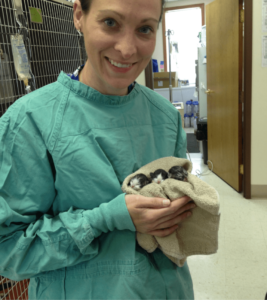 Barks & Recreation is proud to feature Dr. Eileen Savier CVA, CVCH as our Veterinary Blogger in our “From the Vet” Series. Currently part of the team of doctors at Keystone Veterinary Clinic, Dr. Savier is a 2012 Graduate of the Ross University School of Veterinary Medicine, She completed her clinical experience at The Ohio State University and after veterinary school she pursued further education and certification in Veterinary Acupuncture, Chinese Herbal Medicine, and Fear Free veterinary visits. Dr. Savier has a special interest in integrative medicine, animal behavior, and internal medicine and is committed to improving animal health care by integrating Eastern and Western philosophies. She enjoys working with fearful & aggressive dogs and cats and she has had additional training in low stress handling techniques and encourages positive reinforcement during exams and procedures. Her clinical interests include pain management, animal behavior, geriatric patient care, and internal medicine. Dr. Savier is a member of the following associations:
Barks & Recreation is proud to feature Dr. Eileen Savier CVA, CVCH as our Veterinary Blogger in our “From the Vet” Series. Currently part of the team of doctors at Keystone Veterinary Clinic, Dr. Savier is a 2012 Graduate of the Ross University School of Veterinary Medicine, She completed her clinical experience at The Ohio State University and after veterinary school she pursued further education and certification in Veterinary Acupuncture, Chinese Herbal Medicine, and Fear Free veterinary visits. Dr. Savier has a special interest in integrative medicine, animal behavior, and internal medicine and is committed to improving animal health care by integrating Eastern and Western philosophies. She enjoys working with fearful & aggressive dogs and cats and she has had additional training in low stress handling techniques and encourages positive reinforcement during exams and procedures. Her clinical interests include pain management, animal behavior, geriatric patient care, and internal medicine. Dr. Savier is a member of the following associations:
- American Veterinary Medical Association (AVMA)
- International Veterinary Academy of Pain Management (IVAPM)
- American Association of Feline Practitioners (AAFP)
- American Veterinary Society of Animal Behavior (AVSAB)
- American Association of Traditional Chinese Veterinary Medicine (AATCVM)
- Ohio Veterinary Medical Association (OVMA)
Dr. Savier shares her home with two (soon to be three) dogs, two cats, and a toddler. She lovingly refers to her two dogs as Coconut Retrievers as they were rescue dogs she brought home from the island of St. Kitts. In her free time she enjoys spending time with her family, going to the beach, and planning her next Disney vacation.
Join us every month for Dr. Savier’s “From the Vet” series to get more information related to the health and welfare of your furry family members![/vc_column_text][/vc_column][/vc_row]

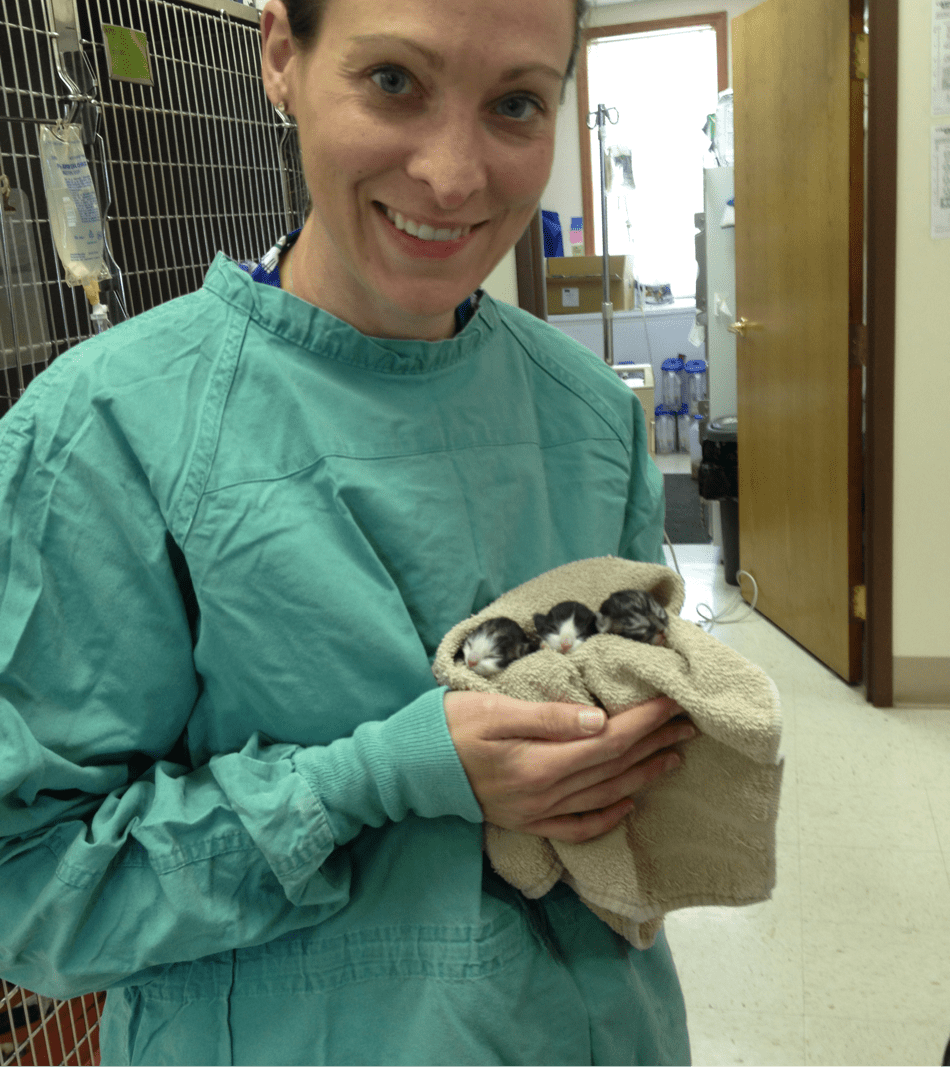 Barks & Recreation is proud to feature Dr. Eileen Savier CVA, CVCH as our Veterinary Blogger in our “From the Vet” Series — offering information related to the health and welfare of your furry family members! Currently part of the team of doctors at Keystone Veterinary Clinic, Dr. Savier is a 2012 Graduate of the Ross University School of Veterinary Medicine, She completed her clinical experience at The Ohio State University and after veterinary school she pursued further education and certification in Veterinary Acupuncture, Chinese Herbal Medicine, and Fear Free veterinary visits. Dr. Savier has a special interest in integrative medicine, animal behavior, and internal medicine and is committed to improving animal health care by integrating Eastern and Western philosophies. She enjoys working with fearful & aggressive dogs and cats and she has had additional training in low stress handling techniques and encourages positive reinforcement during exams and procedures. Her clinical interests include pain management, animal behavior, geriatric patient care, and internal medicine.
Barks & Recreation is proud to feature Dr. Eileen Savier CVA, CVCH as our Veterinary Blogger in our “From the Vet” Series — offering information related to the health and welfare of your furry family members! Currently part of the team of doctors at Keystone Veterinary Clinic, Dr. Savier is a 2012 Graduate of the Ross University School of Veterinary Medicine, She completed her clinical experience at The Ohio State University and after veterinary school she pursued further education and certification in Veterinary Acupuncture, Chinese Herbal Medicine, and Fear Free veterinary visits. Dr. Savier has a special interest in integrative medicine, animal behavior, and internal medicine and is committed to improving animal health care by integrating Eastern and Western philosophies. She enjoys working with fearful & aggressive dogs and cats and she has had additional training in low stress handling techniques and encourages positive reinforcement during exams and procedures. Her clinical interests include pain management, animal behavior, geriatric patient care, and internal medicine. Dr. Savier shares her home with two (soon to be three) dogs, two cats, and a toddler. She lovingly refers to her two dogs as Coconut Retrievers as they were rescue dogs she brought home from the island of St. Kitts. In her free time she enjoys spending time with her family, going to the beach, and planning her next Disney vacation.
Dr. Savier shares her home with two (soon to be three) dogs, two cats, and a toddler. She lovingly refers to her two dogs as Coconut Retrievers as they were rescue dogs she brought home from the island of St. Kitts. In her free time she enjoys spending time with her family, going to the beach, and planning her next Disney vacation.